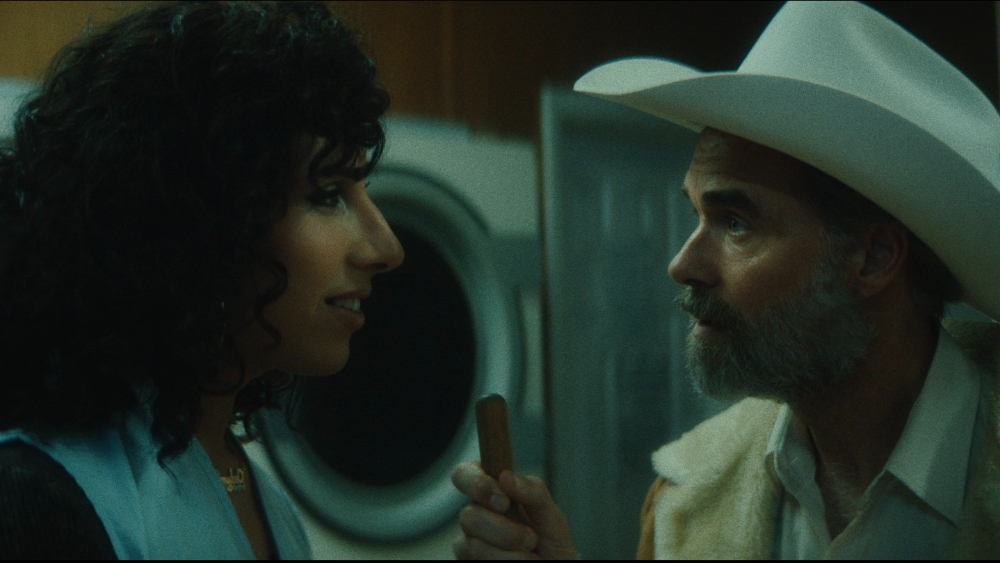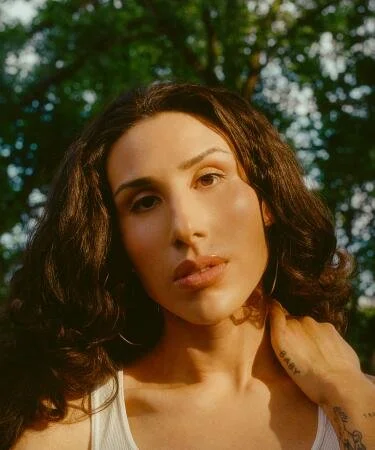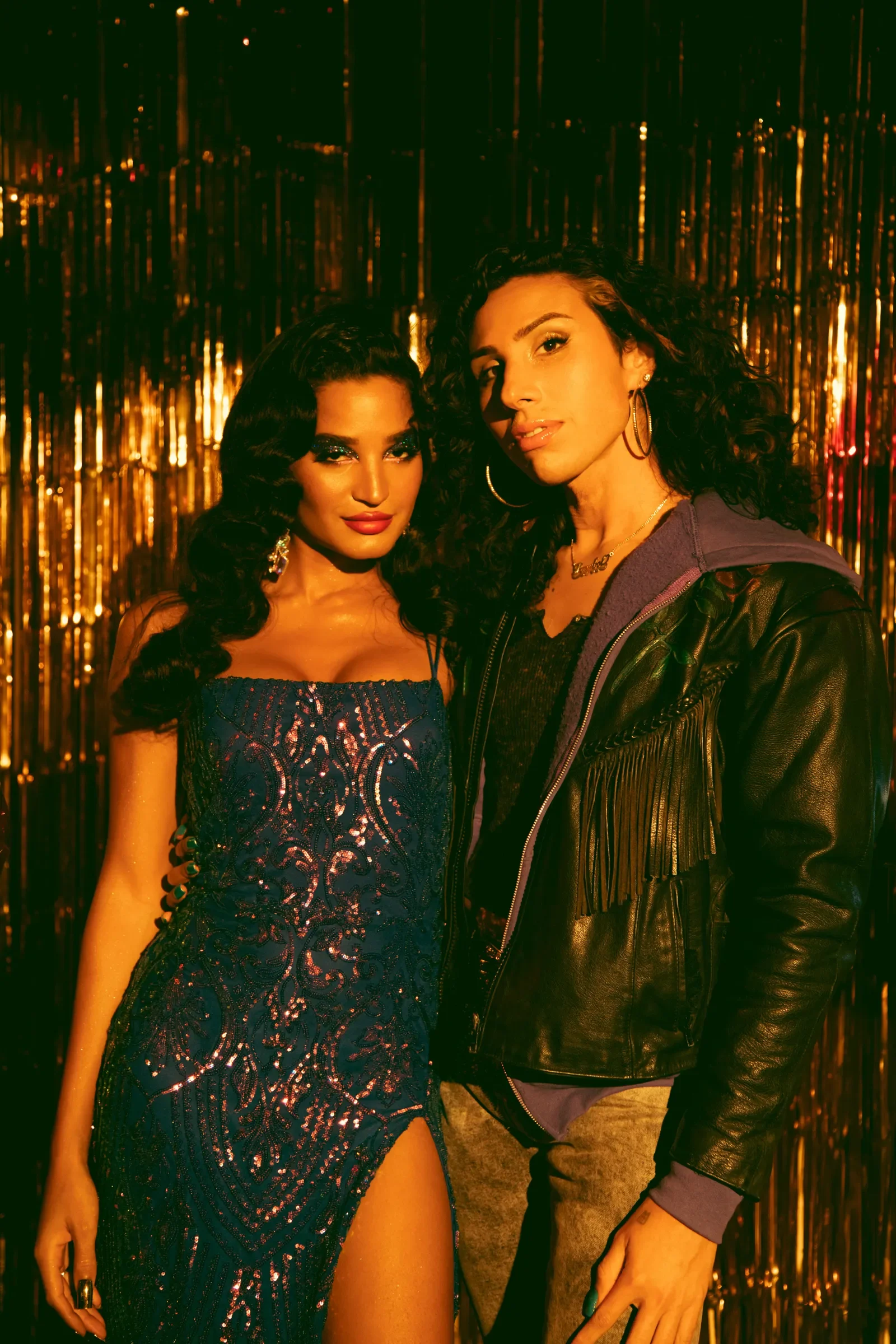‘Ponyboi’ Navigates Intersex and Salvadoran World-making
What shifts in our understanding of Salvadoran intersex and trans life occur when our voices take center stage? This question has been at the heart of my engagement with Ponyboi (2025), the tender and genre-bending debut feature by writer and thespian River Gallo—a self-identified intersex, trans femme Salvadoran. An ode to Gallo’s upbringing in Ridgefield Park, New Jersey, and a gritty world shaped by mob violence and sex work economies, Ponyboi is a deeply emotional contemporary intersex and trans coming-of-age story set over the course of Valentine’s Day, where desire, danger, and the unknown intermingle. Ponyboi (Gallo), the protagonist, moves through these spaces with fragile, luminous bravery, insisting that our lives—our joy, our absurdities, and our refusals—deserve to exist on screen. Tender yet defiant, Ponyboi embodies both the vulnerability and resilience of carving out a place in a world that seeks to deny them.
“What makes Ponyboi—originally a 2019 short film—historic is not only its arrival as one of the first fully funded Hollywood features revolving around an intersex person but also its delicate weaving of intersex and Salvadoran identity.”
What makes Ponyboi—originally a 2019 short film—historic is not only its arrival as one of the first fully funded Hollywood features revolving around an intersex person but also its delicate weaving of intersex and Salvadoran identity. These identities do not simply collide. They work together beautifully, revealing aliveness, resilience, and intimacy. The film is a living testament to how intersex and Salvadoran worlds overlap and generate knowledge that is simultaneously radical, tender, and full of life.
Iain Morland, a British scholar who writes at the intersection of science, gender, and sexuality, asserts that intersex is “the medicalization of a failure to classify the body as one of two sexes.” This failure to fit within a binary constructs intersexuality as unintelligible and in need of correction. Surgical intervention and societal regulation then produce a state, space, and sense of “strangeness” that frames intersex identity as a kind of failure, seeking its erasure from public discourse. While such dynamics resonate with the experiences of many trans and gender-expansive people, Ponyboi’s specificity enriches gender-expansive representation by reminding viewers of a community too often ignored. In this same breath, we must not substitute intersex and trans histories; honoring their lineage is a reminder of their individual experiences. For Gallo, and for other intersex, trans, and gender-expansive audiences, the film signals that our existence is urgent, essential, and beautiful, even in a world that continuously strips away our visibility, rights, and belonging.
I first encountered Ponyboi in 2021. As a scholar of trans Central American Studies—a small area of inquiry within emerging fields—navigating the gaps in literature that reflect my social conditions was alarming. As I encountered the inconsistencies in archives and in the public imagination, our lives and memories were only a death sentence in the backdrop of the extreme everyday violence we face. Widening this work demanded a nuanced, contradictory, and affirming representation within monolithic understandings of gender expansive realities. Many of us, such as Gallo, remind us that there is not one form of living life as an intersex and trans person in a terrain of certainty and discovery. I spent hours immersed in the film, feeling a resonance with my own process of becoming and undoing. Ponyboi’s insistence on visibility became a mirror: a space where decision-making, memory, and joy could converge.
Four years later, I finally got to share my reflections with Gallo, a month after Ponyboi hit theaters nationwide. A beautiful Salvadoran affinity and site of trans world-kin-making, we explored the role of decision-making as a meditative practice amid medical and everyday forms of violence and how it has defined Gallo’s Salvadoran and intersex identity. We also explored how kinship and sisterhood shape the film, and the profound impact Ponyboi has had on Gallo’s life and art.
Ponyboi’s emergence is inseparable from its political moment. In El Salvador, President Nayib Bukele’s administration has consolidated power, using a security discourse to justify mass incarceration and the criminalization of poverty. In the United States, Salvadoran, immigrant communities, and other racialized people face rising xenophobia and systemic neglect in response to longstanding U.S. imperialism and intervention. This has facilitated inhumane deportation to El Salvador, where the government threatens people with dehumanization and death. Mainstream media representation has unfortunately exacerbated reductive portrayals of El Salvador and Salvadorans as violent or criminal.
Gallo intervenes in this history. Following a lineage of Salvadoran artists reckoning with intergenerational trauma started during the Salvadoran Civil War in the mid-to-late 1970s, Gallo expands cultural memory-making through their gendered lens. Their intervention insists that intersex and trans life is part of our collective Salvadoran, Latinx, and intersex archive—a refusal to let erasure dictate future possibility—as the necessary labor of care to ensure justice and liberation remain expansive and accessible.
“At the height of Salvadoran visibility, Ponyboi is coming out—a gentle, queer reflection on Salvadoran identity.”
“At the height of Salvadoran visibility, Ponyboi is coming out—a gentle, queer reflection on Salvadoran identity,” Gallo says. “I am proud of that . . . I could have my own relationship to [Latinidad]—one where we celebrate queer people in all their forms—and that doesn’t take away from my pride in being Salvadoran and trans.”
Latinidad, in Gallo’s definition, becomes a living, evolving articulation that divorces itself from anti-Blackness, transphobia, heteronormativity, and the exclusionary institutionalized beliefs embedded in Latinidad. In their own words, it must be understood and experienced as a gentle, queer mediation; a process of centering what remains unknown, and celebrating these histories, desires, and futures—a commitment to Black, Indigenous, trans, and gender expansive life-making. Only then can we celebrate Latinidad.
One of the film’s most striking dimensions is its worldmaking. Ponyboi encounters Bruce, a cowboy who appears at the laundromat where the protagonist works and lives. Bruce offers a chance to escape, an invitation to Las Vegas and a moment of tender care. This space softens the familiar tropes of mob films and crime cinema, transforming it into a phantasmic, trans-imagined terrain. The intersex-trans imaginary becomes a site of possibility, a way of dreaming a world outside of the tropes that reject and violate our existence.
Fantasia, or the phantasmic, becomes survival. It allows Ponyboi to navigate a world that often seeks to erase them, finding moments of affirmation and intimacy even amid structural violence. These imaginative spaces—often blurring sexual encounters with their dreams—illuminate the emotional, embodied realities of trans Salvadorans, where care, desire, and joy are radical acts performed in defiance of erasure.
“These imaginative spaces—often blurring sexual encounters with their dreams—illuminate the emotional, embodied realities of trans Salvadorans, where care, desire, and joy are radical acts performed in defiance of erasure.”
While not explicit, Bruce also carries echoes of Ponyboi’s father—a reminder of the trust and care so often denied to gender-expansive people within their families. Bruce’s presence gestures toward the possibility of a different inheritance: a nurturing bond, a paternal love, a promise of giving children a better life than the one they lived. In this sense, Bruce embodies both a tender fantasy and a radical reimagining of kinship, where chosen and imagined care figures stand in for what family has withheld.
Naming, too, emerges as an essential practice in this worldmaking. For many gender nonconforming individuals, asserting one’s own name into a space is a claim of existence, an act of resistance, and a pathway to agency. Ponyboi wears their name visibly—and proudly —through badges, utterances, and gestures. Rooted in medical and familial violence, the first half of their name, “Pony,” serves as a reminder of their father gifting them a stuffed pony toy every time they visited the doctor. “Boi” was a play on what their family expected them to be. Naming, in this context, is both intimate and political. It is a tool for survival and for self-articulation—a way of claiming space in a world that often seeks to deny it. Through Ponyboi’s name, we witness the interplay between family, expectation, bodily autonomy, and the courage to assert oneself fully. Though Vinny—Ponyboi’s pimp and their best friend Angel’s boyfriend—played by Dylan O’Brien, often mimics their name and sexualizes their body, Ponyboi continually reminds him of their truth. It is through this act of utterance, of voicing themselves, that Ponyboi claims presence, respect, and agency.
Kinship stands as a pillar that supports Ponyboi’s self-articulation, shaping how they come to understand and affirm themselves. The friendships in Ponyboi—especially between Ponyboi and Angel—exemplify how relationships can be radical acts of care and survival. “I asked my mom what her favorite part of the movie was, and she said it was the friendship between Ponyboi and Angel—how they looked out for each other and cared for each other, and how that transcended the violence, deaths, cheating, betrayal, the unborn child . . . their love and sisterhood surpassed all of that,” Gallo says. “I think that's something to be said about Salvadoran women or Latina women, you know, we got each other's backs in a way. We know the stakes and we know what we're up against, and we know all the things that have put us into a corner and somehow we’re still able to celebrate each other and show up every day.”
Kinship is presented as resistance: a framework through which care, accountability, and relationality flourish despite structural and interpersonal violence. For Salvadoran women— though Angel is a cis white woman—these relationships are life-sustaining, modeling the ways we show up for one another even when the world conspires against us. In these moments, survival is not just about endurance but about cherishing one another. It is about finding each other through the rubble and holding one another in our contradictions and journeys. A commitment to life, Salvadoran kinship must remain central in our worldings: a sign of mutual care, support, and understanding beyond normative relationship-building.
In Ponyboi, sex work is a site of negotiation between constraint and agency. For many gender-expansive people, sex work is both a survival strategy and a space of relational intimacy. Gallo draws the connection between intersex medical experiences and sex work, revealing a layered allegory.
“I was exploring sex work because it felt like revisiting my medical experiences as an intersex person—feeling as though my body did not belong to me, that it was constantly for observation or use by others, particularly doctors,” Gallo says. “There was this dissociation. Sex work became an allegory: my body belongs to others, is in service to others. But I also realized that sex work can be incredibly empowering. It’s where we find agency and ownership of our bodies. Yet often, for gender-expansive people, it’s the job we enter because no other jobs are available.”
This movement toward empowerment propels Ponyboi’s journey with Bruce, a refusal to let their body remain an object for others’ gaze. The film further develops this theme through Ponyboi’s relationships with their friends, Foxy and Yolanda, who are Black trans sex workers—highlighting the protective, communal dimensions of survival.
“One of my favorite parts of the movie is the relationship with Foxy and Yolanda,” Gallo says. “When things go down, these two say, ‘We’re gonna get out of here.’ In another movie, we might’ve been the first ones killed. Here, we’re the first to leave.”
Even amid structural violence, the film shows that survival is bound with joy, protection, and solidarity. In Gallo’s hands, sex work becomes a site of kinship, community-making, and relational care. Through it, they widen the intersex-trans Salvadoran imaginary, placing self-autonomy and decision-making at the forefront. It is a crucial reminder that as we move alongside sex workers—while society relies on their exclusion—we must extend humanity, dignity, and life. More importantly, we must offer resources and care.
Perhaps the film’s most profound philosophical moment occurs in its center, in what Gallo describes as its thesis: a scene with renowned trans Afro-Latina actress Indya Moore, who plays Charlie—a former girl of Vinny’s who now finds herself selling hormones, specifically testosterone, to Ponyboi. In this intimate exchange between a trans and intersex person, Gallo’s character confronts the possibility of self-determination and questions their need to hold onto testosterone:
“This is all smoke and mirrors,” Moore says. “What we must honor is the work we do beyond medical transitioning—the spiritual work to become the person we want to be, in the world we want to see ourselves in.”
Charlie, who managed to flee the circumstances that once defined her life, reminds Ponyboi that in our journeyings, we must decide who we are and what we want from the worlds we inhabit. This moment of trans Latina sisterhood resists the social markers that weigh heavily on our bodies and instead foregrounds care, choice, and investment in building better worlds.
“Writing that scene with Indya, I thought I would have it figured out,” Gallo says. “But then I realized it might just be a question that kind of lingers forever. And I think that's beautiful, that we're never finished. We’re constantly working in progress. The idea that there’s a prize after transition or coming out—that’s a trap. The prize is in the action itself, in the embodied moments of living our truth. Smoke and mirrors doesn’t mean magic tricks don’t have consequences—they do, good and bad, euphoric or violent. So it’s this weird kind of contradiction.
“I feel like it’s a scene that will stand the test of time in cinema. People will look back at it and say, ‘This was the first time gender was expressed between an intersex and a trans person not just on a sociological or biological level, but on a spiritual and philosophical one—seeing its construction, its fantasy.’”
The scene insists that the work of becoming—embodied, meditative, relational—is as crucial as any outcome. While Ponyboi complicates representation, it also commits to reminding us of our humanity. No matter where we find ourselves, we can still choose how to live. That choice—at the core of intersex, trans, and gender-expansive labor of care—is the work we must recognize in ourselves, in our kin, and in those we encounter along the way.
Ponyboi offers us a vision of what becomes possible when we practice listening, witnessing, and remembering intersex and trans life. It is not only a film but a world where joy, care, intimacy, and imagination flourish alongside—and in defiance of—histories of oppression and erasure. Listening here is not passive; it is an act of reclamation, a demand that we reimagine history, forge kinship, and construct futures where intersex and trans existence is visible, celebrated, and protected.
For me, Ponyboi has been both a scholarly lens and a personal compass. It reveals that worldmaking, kinship, self-articulation, care, and relationality are not abstract ideals but inseparable practices of survival. It insists that our stories matter, that our voices are urgent, and that our imaginaries—fantasia, smoke, and mirrors included—are vital maps for building the worlds we need.
But listening is only the beginning. To listen is to acknowledge the past, to witness the present, and to imagine futures—but beyond listening, we must act: to resource trans and intersex communities, to protect our kin, to honor our care work, and to commit to solidarities that sustain life against dispossession. Ponyboi reminds us that survival is not simply endurance—it is joy, resistance, and the everyday labor of making worlds that hold us.
In this way, the film leaves us with a charge: to listen, yes, but also to build—to ensure that intersex and trans Salvadorans, and all gender-expansive people, are recognized as architects of livable futures.



